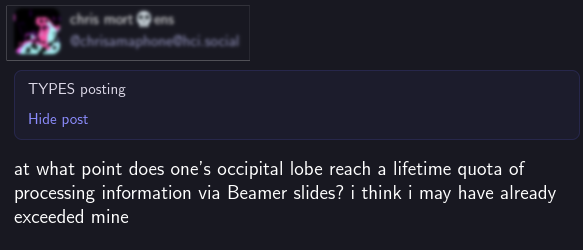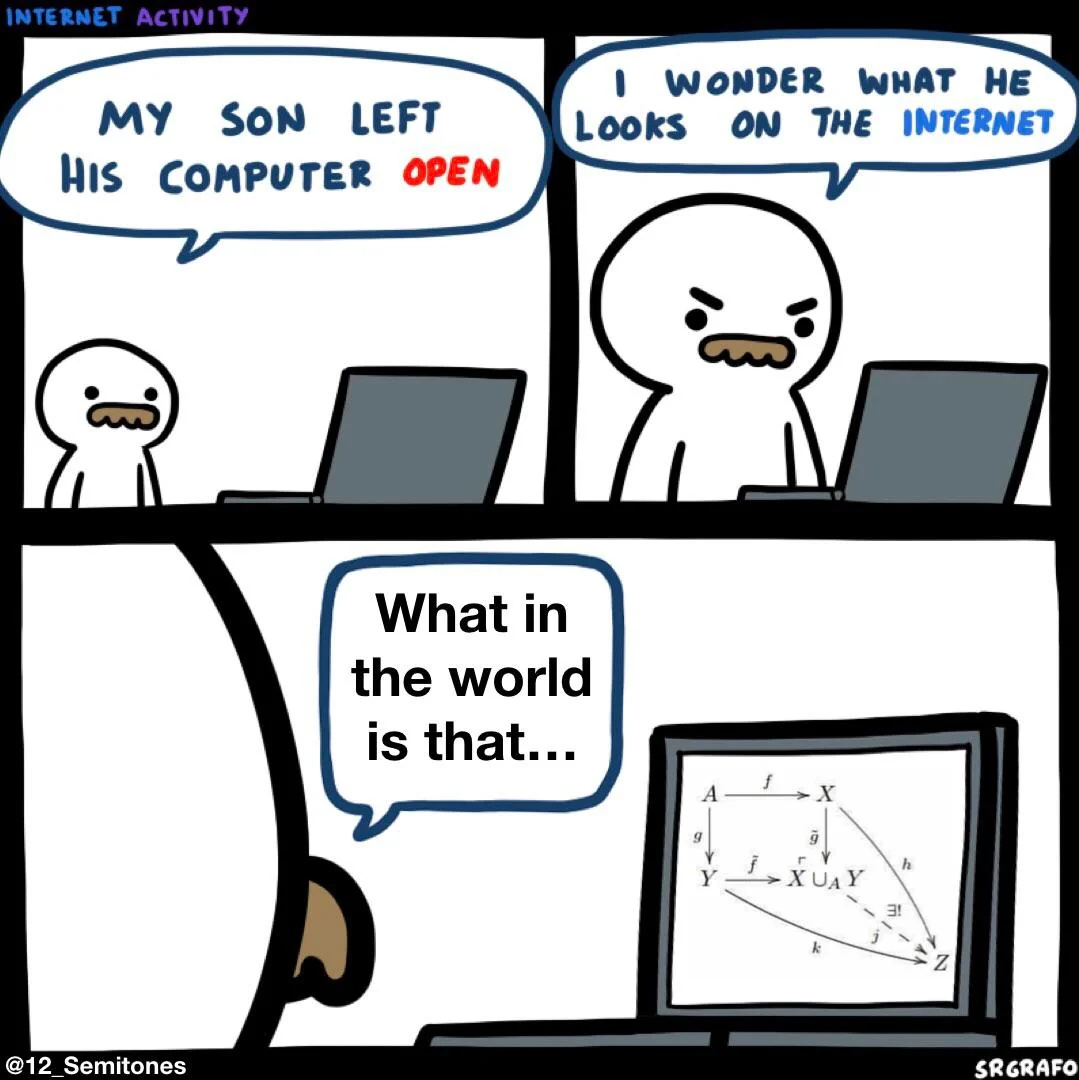I want you to give better talks
I’ve been feeling very burned out recently, so, rather than writing the paper I'm working on, I went to a mini-workshop on “Applied Algebra and Geometry”. This post isn’t me shitting on anyone in particular at that workshop, but it did lead to me having a weird dream where I was stuck in a really terrible Haskell talk. The end result of that is this collection of advice, maybe a bit of a rant, about academic speaking, and which I am writing mostly because I repeat this whenever someone asks me to look over their slides or sit in on a practice talk. I do not consider myself a talented public speaker; I am just someone who has been to many and has opinions.
Meta-advice
First, a piece of meta-advice: ask for all the advice you can get and then do whatever you want. This is not contradictory. Most people, when you ask them for advice, tell you what they wish they did rather than what they actually do. This is good and noble (they are trying to save you from mistakes they made), but if you are trying to model yourself on them, it probably won’t be much use. Good artists aren’t necessarily good critics and vice versa.
Wait a second, you aren’t trying to model yourself after a particular speaker? Why not? If you are trying to get better at something, there is nothing wrong with copying someone else. That’s what learning is. If I could be any public speaker, it’d be Alec Ryrie, a professor of religion at Durham University. Seriously, go watch him speak. He’s compelling, his command of his material is evident, and he tells great stories. While I’m at it, which writers do you want to copy? I refer back to Simon Peyton Jones’ “How to write a paper” all the time. I like a snappy title, so I devoured Conor McBride and Phil Wadler’s papers. If you don’t have a favourite academic writer, find one.
Anyway, the second half of that piece of advice was “do whatever you want”. No one (except maybe your supervisor) can really make you say anything. If you disagree with the advice you are given, that is normal, and you have my permission to ignore it. However, you should have at least thought about it and know why you are rejecting it. You are giving the talk, not them, so do work you would stand by.
The actual advice
The most important advice you probably need to hear is that you have too many slides and there is too much on your slides. How could I possibly know that? I haven’t seen your talk, after all. Well, it’s because basically everyone has too many slides with too much on them. I think I took this advice from a particular “How to Speak” lecture (go watch it), but it’s usually the first thing I tell people after being sent their slides or watching their practice talk. We’ve all heard the Pascal quote. As a rule of thumb, you should never have more slides than minutes, and if you can, average at least two minutes per slide. That’s the most important point; if you want to, you can stop reading now.
I think this problem stems from two sources: people don’t know what they want to say, and they watch talks by people who don’t know what they want to say. The latter isn’t entirely their fault (those probably make up at least half the talks at any conference), except that when they go to write their own, they model themselves after bad speakers (see above) because that’s what they think they have to do.
I’m going to be blunt here: if you don’t know what you want to say, why are you giving a talk in the first place? Right, for your career, but if that’s the case, bad presentations have their own professional consequences. They will ignore the lovely theorems you proved, and use that time to write their own talks instead of listening to yours. Maybe a seminar organiser will remember you and not invite you as a result.
If you had to sum up your entire talk in one slide or even a single line, could you do it? I’m not sure that I can, but I do try. Can you explain your research to a stay-at-home dad on a plane? And don’t give me “it’s too technical” or “they don’t know any category theory”, have you tried? I managed to explain containers and Weihrauch reducibility to just such a person, and if I can do that, you can too. “What one fool can do, another can”.
What is the main result? Can you put it at the beginning when people are still paying attention? Do it. Actually, can you make it the only thing on the slide? Oh, and make sure you repeat it at the end. “Say what you are going to say, say it, then say what you said”.
Do you need all that background? Actually, back up, who is your intended audience? If you want to give a talk for specialists, make it clear at the outset, or save it for a seminar. Yes, fewer people will show up, but they won’t just be sitting there out of politeness. If you are at a conference, tailor your talk to the types of people who actually attend that kind of conference.
Can you cut half your material? It’s easier than you might think. Just because you use the term “overt space” once doesn’t mean you necessarily need a full definition; just make an offhand remark like “oh, it’s dual to compactness”. Do you really need to say “Let n be a natural number”? Is it obvious from convention or context? Do you have a paragraph of text on your slides? Would you read that entire paragraph if you were watching this talk? Could you replace it with bullet points? Actually, can you make it a diagram? You are there to give a talk, not read from your slides. Your slides should support you, not the other way around. If they can get everything they need from reading your slides, then why not just write a blog post instead?
Just because you have a theorem doesn’t mean you need to give the full proof. Is it really important that they see all the algebraic manipulations you are doing? Maybe it is, if the techniques used in the proof are the point of the talk. But if it isn’t, can you cut it? If you can’t cut it, can you sketch it? If your proof has four main ideas, just say those. People are coming to you for your ideas, not for rigour. If they like what they hear, they actually will read your paper.
No one has ever complained about a talk finishing five minutes early. You know how there is never any time for questions? Be the person who gives them that time. People will come up to you at the end and say how much they enjoyed having the time for a real discussion. How do I know? It happened to me at CiE.
Now, it’s not all cut. Give more examples! Spend more time on examples. Tell people about all the cool work you’re building on. If you think someone will ask about something, have a “post-credits” slide that addresses it. If something is important, say so. Repeat important stuff. Repetition legitimises. Repetition legitimises. Make sure no one leaves without knowing exactly what it is you did and why you think it is important.
Most of my advice can be summed up as follows: What are all the things you don’t like about listening to talks? Don’t do them! Be opinionated. There is a weird conflation people have where they associate being opinionated with being an asshole. You are allowed to have opinions, just don’t be callous in expressing them. People actually do like it when you have a clear vision about what you are doing, how you are doing it and why you are doing it that way. They might disagree with you; that’s life, they are allowed to do that. Which leads me to a bunch of my own pet peeves.

You don’t have to use Beamer. Yes, I know all my talks are in Beamer, but that’s because I’m lazy. That’s probably why you use it too. Have you considered not using Beamer? You can just handwrite your slides, e.g., Bryce Clarke does this, and I always enjoy looking at their slides (example). At one automata conference I attended this year, Beamer was the exception rather than the rule, and it was great. There was clever use of layout and spacing, and even some judicious use of animation. Hats off to everyone involved.
Speaking of animation, I hate Beamer overlays. I understand why you think they are useful; they allow you to control when information is displayed to the listener. I think that is overrated. For a start, if you have n bullet points, then the kth bullet point appears (n-k) times. This means that if you leave important information to the end, people are less likely to see it, especially if their attention wavers for a second, perhaps because they were making a note of something great you said. Have you considered reducing the opacity instead of making it invisible, or highlighting the current item instead? That way, all text is always visible even whe nit is not the focus. I consider this an accessibility feature.
Use a colour-blind friendly palette. I am not colour-blind, but about 1 in 10 men are. You can read more about colour blindness here or use a simulator to get an idea about how someone with various types of colour blindness might see your diagram. This requires conscious effort, but it doesn’t have to be too difficult; you can find your own favourite palette (I’m partial to the IBM one) and stick with it from here on out. That said, you shouldn’t really be using colour alone to distinguish something: make it bold, or in italics, or use different shapes for each coloured dot, or whatever.
I think the humanities are right about referencing. Having a reference on the slide in a footnote is almost certainly superior to having a citation key and a bunch of references at the end. At the very least, we should be using Harvard style [author, year] references, or similar, rather than Vancouver [1] references. This just makes it easier to tell what is being referenced as it happens, rather than having to pop it on the stack and remember at the end.
You are allowed to have fun. Make a meme, tell a joke, make references to things that happened earlier in the conference. Just because it’s your job doesn’t mean you have to take it seriously.

Finally, know your timeslot. If you are on the last day of a week-long conference, I’m sorry, but people are tired and looking forward to going home. It wasn’t your fault, but you are going to have to go easy on us.
Wrapping up
You might think that looking at my own slides would be a good idea right now, you know, to “see how it's done”. Alas, I will probably disappoint you. I’m only human after all, but I do try, and all this is what I aspire to. Feel free to drop me a line by email, or on Mastodon, if you have a particularly good public speaker you want to recommend.
Special thanks to my friend Denis for looking over this screed and helping clean up some of the more incoherent parts.
